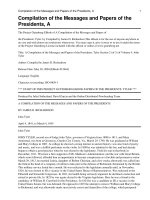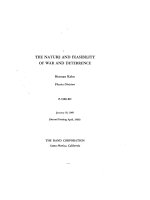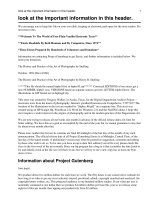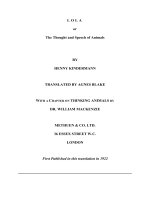The Wit And Humor Of America Volume Ii By Various, Marshall P. Wilder pdf
Bạn đang xem bản rút gọn của tài liệu. Xem và tải ngay bản đầy đủ của tài liệu tại đây (698.92 KB, 162 trang )
The Wit and Humor of
America - Volume II
Various
Edited by Marshall P. Wilder
JAMES WHITCOMB RILEY
THE WIT AND HUMOR OF AMERICA
EDITED BY MARSHALL P. WILDER
In Ten Volumes
Volume II
MDCCCCVII
CONTENTS
Archæological Congress, An
Robert J. Burdette
Aunt Dinah‘s Kitchen
Harriet Beecher Stowe
Ballad
Charles Godfrey Leland
Barney McGee
Richard Hovey
Beecher Beached, The
John B. Tabb
Boy‘s View of It, A
Frank L. Stanton
Budd Wilkins at the Show
S.E. Kiser
Colonel‘s Clothes, The
Caroline Howard Gilman
Comin‘ Thu
Anne Virginia Culbertson
Dutchman Who Had the “Small Pox,“ The
Henry P. Leland
Evening Musicale, An
May Isabel Fisk
Familiar Authors at Work
Hayden Carruth
Fascination
John B. Tabb
Golfer‘s Rubaiyat, The
H.W. Boynton
Go Lightly, Gal (The Cake Walk)
Anne Virginia Culbertson
Grandma Keeler Gets Grandpa Ready for Sunday-School
Sarah P. McLean Greene
Hoosier and the Salt Pile, The
Danforth Marble
How “Ruby“ Played
George W. Bagby
Letter, A
Petroleum V. Nasby
Lost Word, The
John Paul
Love Sonnets of a Hoodlum
Wallace Irwin
Mr. Dooley on Gold-Seeking
Finley Peter Dunne
Mr. Dooley on Reform Candidates
Finley Peter Dunne
Natural Perversities
James Whitcomb Riley
Nautical Ballad, A
Charles E. Carryl
Old Deacon‘s Version of the Story of the Rich Man and Lazarus,
The
Frank L. Stanton
Our Best Society
George William Curtis
Plagiarism
John B. Tabb
Recruit, The
Robert W. Chambers
“Ringworm Frank“
James Whitcomb Riley
Rival Entertainment, A
Kate Field
Samuel Brown
Phoebe Cary
Seffy and Sally
John Luther Long
She Talked
Sam Walter Foss
Strike at Hinman‘s, The
Robert J. Burdette
Two Brothers, The
Carolyn Wells
Two Farmers, The
Carolyn Wells
Two New Houses, The
Carolyn Wells
Two Suitors, The
Carolyn Wells
Vive La Bagatelle
Gelett Burgess
Walk
William Devere
Way it Wuz, The
James Whitcomb Riley
Yawcob Strauss
Charles Follen Adams
Yes?
John Boyle O‘Reilly
The Wit and Humor of America - Volume II
1
THE TWO NEW HOUSES
BY CAROLYN WELLS
Once on a Time, there were Two Men, each of whom decided to
build for himself a Fine, New House.
One Man, being of an Arrogant and Conceited Nature, took counsel
of Nobody, but declared that he would build his House to suit
himself.
“For, “ said he, “since it is My House and I am to Live in It, why
should I ask the Advice of my Neighbors as to its Construction? “
While the House was Building, the Neighbors came often and
Looked at it, and went away, Whispering and Wagging their Heads
in Derision.
But the Man paid no Heed, and continued to build his House as he
Would.
The Result was that, when completed, his House was lacking in
Symmetry and Utility, and in a Hundred ways it was Unsatisfactory,
and for each Defect there was a Neighbor who said, “Had you asked
Me, I would have Warned you against that Error. “
The Other Man, who was of a Humble and Docile Mind, went to
Each of his Neighbors in Turn, and asked Advice about the Building
of his House.
His Friends willingly and at Great Length gave him the Benefit of
their Experiences and Opinions, and the Grateful Man undertook to
Follow Out all their Directions.
The Result was that his House, when finished, was a Hodge-Podge
of Varying Styles and Contradictory Effects, and Exceedingly
Uncomfortable and Inconvenient to Live In.
MORALS
This Fable teaches that In a Multitude of Counselors there is Safety,
and that Too Many Cooks Spoil the Broth.
The Wit and Humor of America - Volume II
2
YES?
BY JOHN BOYLE O‘REILLY
The words of the lips are double or single,
True or false, as we say or sing:
But the words of the eyes that mix and mingle
Are always saying the same old thing.
The Wit and Humor of America - Volume II
3
FASCINATION
BY JOHN B. TABB
Among your many playmates here,
How is it that you all prefer
Your little friend, my dear?
“Because, mamma, tho‘ hard we try,
Not one of us can spit so high,
And catch it in his ear.“
The Wit and Humor of America - Volume II
4
BARNEY MCGEE
BY RICHARD HOVEY
Barney McGee, there‘s no end of good luck in you,
Will-o‘-the-wisp, with a flicker of Puck in you,
Wild as a bull-pup, and all of his pluck in you—
Let a man tread on your coat and he‘ll see!
Eyes like the lakes of Killarney for clarity,
Nose that turns up without any vulgarity,
Smile like a cherub, and hair that is carroty—
Whoop, you‘re a rarity, Barney McGee!
Mellow as Tarragon,
Prouder than Aragon—
Hardly a paragon,
You will agree—
Here‘s all that‘s fine to you!
Books and old wine to you!
Girls be divine to you,
Barney McGee!
Lucky the day when I met you unwittingly,
Dining where vagabonds came and went flittingly.
Here‘s some Barbera to drink it befittingly,
That day at Silvio‘s, Barney McGee!
Many‘s the time we have quaffed our Chianti there,
Listened to Silvio quoting us Dante there—
Once more to drink Nebiolo spumante there,
How we‘d pitch Pommery into the sea!
There where the gang of us
Met ere Rome rang of us,
They had the hang of us
To a degree.
How they would trust to you!
That was but just to you.
Here‘s o‘er their dust to you,
Barney McGee!
Barney McGee, when you‘re sober you scintillate,
But when you‘re in drink you‘re the pride of the intellect;
Divil a one of us ever came in till late,
Once at the bar where you happened to be—
The Wit and Humor of America - Volume II
5
Every eye there like a spoke in you centering,
You with your eloquence, blarney, and bantering—
All Vagabondia shouts at your entering,
King of the Tenderloin, Barney McGee!
There‘s no satiety
In your society
With the variety
Of your esprit.
Here‘s a long purse to you,
And a great thirst to you!
Fate be no worse to you,
Barney McGee!
Och, and the girls whose poor hearts you deracinate,
Whirl and bewilder and flutter and fascinate!
Faith, it‘s so killing you are, you assassinate—
Murder‘s the word for you, Barney McGee!
Bold when they‘re sunny, and smooth when they‘re showery—
Oh, but the style of you, fluent and flowery!
Chesterfield‘s way, with a touch of the Bowery!
How would they silence you, Barney machree?
Naught can your gab allay,
Learned as Rabelais
(You in his abbey lay
Once on the spree).
Here‘s to the smile of you,
(Oh, but the guile of you!)
And a long while of you,
Barney McGee!
Facile with phrases of length and Latinity,
Like honorificabilitudinity,
Where is the maid could resist your vicinity,
Wiled by the impudent grace of your plea?
Then your vivacity and pertinacity
Carry the day with the divil‘s audacity;
No mere veracity robs your sagacity
Of perspicacity, Barney McGee.
When all is new to them,
What will you do to them?
Will you be true to them?
Who shall decree?
Here‘s a fair strife to you!
The Wit and Humor of America - Volume II
6
Health and long life to you!
And a great wife to you, Barney McGee!
Barney McGee, you‘re the pick of gentility;
Nothing can phase you, you‘ve such a facility;
Nobody ever yet found your utility—
There is the charm of you, Barney McGee;
Under conditions that others would stammer in,
Still unperturbed as a cat or a Cameron,
Polished as somebody in the Decameron,
Putting the glamour on price or Pawnee.
In your meanderin‘,
Love and philanderin‘,
Calm as a mandarin
Sipping his tea!
Under the art of you,
Parcel and part of you,
Here‘s to the heart of you,
Barney McGee!
You who were ever alert to befriend a man,
You who were ever the first to defend a man,
You who had always the money to lend a man,
Down on his luck and hard up for a V!
Sure, you‘ll be playing a harp in beatitude
(And a quare sight you will be in that attitude)—
Some day, where gratitude seems but a platitude,
You‘ll find your latitude, Barney McGee.
That‘s no flim-flam at all,
Frivol or sham at all,
Just the plain—Damn it all,
Have one with me!
Here‘s one and more to you!
Friends by the score to you,
True to the core to you,
Barney McGee!
The Wit and Humor of America - Volume II
7
THE OLD DEACON‘S VERSION OF THE STORY OF THE RICH
MAN AND LAZARUS
BY FRANK L. STANTON
I s‘pose yo‘ know de story, O my brotherin‘, er de man
Dat wuz rich ez cream, en livin‘ on de fatness er de lan‘?
How he sot dar eatin‘ ‘possum, en when Laz‘rus ax fer some,
He tell ‘im: “Git erway, dar! fer you‘ll never git a crumb!“
De rich man wuz a feastin‘ f‘um his chiny plate en cup,
Kaze he ‘fraid his po‘ relations come en eat his wittles up;
I spec‘ he had two ‘possums on de table long en wide,
En a jimmyjohn er cane juice wuz a-settin‘ by his side.
En he say: “Dis heah des suits me, en I gwine ter eat my fill;
But I‘ll sic de dogs on Laz‘rus, ef he waitin‘ roun‘ heah still.“
En de dogs commence dey barkin‘, raise a racket high en low,
En when Laz‘rus see ‘em comin‘ he decide ‘twuz time ter go.
So, he limp off on his crutches, en de rich man think it‘s fun,
But I reckon Laz‘rus answer: “I‘ll git even wid you, son!“
De rich man so enjoy hisse‘f he laugh hisse‘f ter bed,
En, brotherin‘, when he wake up he wuz stiff, stone dead!
En den he raise a racket, en he holler out: “What dis?
De place is onfamiliar, en I wonder whar‘ I is?“
Den Satan, he mek answer: “I‘m de man ter tell you dat:
You‘s in de fire department er de place I livin‘ at!“
Den de rich man say: “Whar‘ Laz‘rus dat wuz beggin‘ at my
gate?“
En Satan tell him: “Yander, wid a silver spoon en plate;
En he eatin‘ fit ter kill hisse‘f! He spendin‘ er de day
Wid good ol‘ Mister Abra‘m, but he mighty fur away!“
“Will you please, suh,“ say de rich man, “ax him bring a drink ter
me,
Wid a li‘l‘ ice ter cool it? Kaze I hot ez hot kin be!“
But Satan fall ter laughin‘, whilst he stir de fire roun‘:—
“De ice would melt, my brother, ‘fo‘ it ever hit de groun‘!“
The Wit and Humor of America - Volume II
8
Den he fill a cup wid brimstone—fill it steamin‘ ter de top;
But de rich man say he swear off, dat he never tech a drop!
But Satan grab his pitchfork whilst de rich man give a squall,
En in ‘bout a half a second he had swallered cup en all!
Now, dat‘s erbout de story er de rich man at de feas‘,
What wouldn‘t pass de ‘possum roun‘ when Laz‘rus want a piece.
De ‘possum means yo‘ pocketbook, de moral‘s plain ez day:
Shake de dollars in de basket ‘fo‘ you go de rich man‘s way!
The Wit and Humor of America - Volume II
9
THE TWO SUITORS
BY CAROLYN WELLS
Once on a Time there was a Charming Young Maiden who had Two
Suitors.
One of These, who was of a Persistent and Persevering Nature,
managed to be Continually in the Young Lady‘s Company.
He would pay her a visit in the Morning, Drop In to Tea in the
Afternoon, and Call on her Again in the Evening.
He took her Driving, and he Escorted her to the Theater. He would
take her to a Party, and then he would Dance, or Sit on the Stairs, or
Flit into the Conservatory with her.
The Young Lady admired this man but she Wearied of his never-
ceasing Presence, and she Said to Herself, “If he were not Always at
my Elbow I should Better Appreciate his Good Qualities. “
The Other Suitor, who considered himself a Man of Deep and
Penetrating Cleverness, said to himself, “I will Go Away for a Time,
and then my Fair One will Realize my Worth and Call Me Back to
Her. “
With a sad Visage he made his Adieus, and he Exacted her Pledge to
Write to him Occasionally. But after he had Gone she Forgot her
Promise, and Soon she Forgot his Very Existence.
MORALS
This Fable teaches that Absence Makes the Heart Grow Fonder, and
that Out of Sight is Out of Mind.
The Wit and Humor of America - Volume II
10
THE RECRUIT
BY ROBERT W. CHAMBERS
Sez Corporal Madden to Private McFadden:
“Bedad, yer a bad ‘un!
Now turn out yer toes!
Yer belt is unhookit,
Yer cap is on crookit,
Ye may not be dhrunk,
But, be jabers, ye look it!
Wan—two!
Wan—two!
Ye monkey-faced divil, I‘ll jolly ye through!
Wan—two!
Time! Mark!
Ye march like the aigle in Cintheral Parrk!“
Sez Corporal Madden to Private McFadden:
“A saint it ud sadden
To dhrill such a mug!
Eyes front! ye baboon, ye!
Chin up! ye gossoon, ye!
Ye‘ve jaws like a goat—
Halt! ye leather-lipped loon, ye!
Wan—two!
Wan—two!
Ye whiskered orang-outang, I‘ll fix you!
Wan—two!
Time! Mark!
Ye‘ve eyes like a bat! can ye see in the dark?“
Sez Corporal Madden to Private McFadden:
“Yer figger wants padd‘n—
Sure, man, ye‘ve no shape!
Behind ye yer shoulders
Stick out like two bowlders;
Yer shins is as thin
As a pair of pen-holders!
Wan—two!
Wan—two!
Yer belly belongs on yer back, ye Jew!
The Wit and Humor of America - Volume II
11
Wan—two!
Time! Mark!
I‘m dhry as a dog—I can‘t shpake but I bark!“
Sez Corporal Madden to Private McFadden:
“Me heart it ud gladden
To blacken yer eye.
Ye‘re gettin‘ too bold, ye
Compel me to scold ye—
‘T is halt! that I say—
Will ye heed what I told ye?
Wan—two
Wan—two!
Be jabers, I‘m dhryer than Brian Boru!
Wan—two!
Time! Mark!
What‘s wur-ruk for chickens is sport for the lark!“
Sez Corporal Madden to Private McFadden:
“I‘ll not stay a gadd‘n
Wid dagoes like you!
I‘ll travel no farther,
I‘m dyin‘ for—wather;
Come on, if ye like—
Can ye loan me a quarther?
Ya-as, you,
What—two?
And ye‘ll pay the potheen? Ye‘re a daisy!
Whurroo!
You‘ll do!
Whist! Mark!
The Rigiment‘s flatthered to own ye, me spark!“
The Wit and Humor of America - Volume II
12
THE BEECHER BEACHED
BY JOHN B. TABB
Were Harriet Beecher well aware
Of what was done in Delaware,
Of that unwholesome smell aware,
She‘d make all heaven and hell aware,
And ask John Brown to tell her where
Henceforth she best might sell her ware.
The Wit and Humor of America - Volume II
13
OUR BEST SOCIETY
BY GEORGE WILLIAM CURTIS
If gilt were only gold, or sugar-candy common sense, what a fine
thing our society would be! If to lavish money upon objets de vertu, to
wear the most costly dresses, and always to have them cut in the
height of the fashion; to build houses thirty feet broad, as if they
were palaces; to furnish them with all the luxurious devices of
Parisian genius; to give superb banquets, at which your guests
laugh, and which make you miserable; to drive a fine carriage and
ape European liveries, and crests, and coats-of-arms; to resent the
friendly advances of your baker‘s wife, and the lady of your butcher
(you being yourself a cobbler‘s daughter); to talk much of the “old
families“ and of your aristocratic foreign friends; to despise labor; to
prate of “good society“; to travesty and parody, in every conceivable
way, a society which we know only in books and by the superficial
observation of foreign travel, which arises out of a social
organization entirely unknown to us, and which is opposed to our
fundamental and essential principles; if all this were fine, what a
prodigiously fine society would ours be!
This occurred to us upon lately receiving a card of invitation to a
brilliant ball. We were quietly ruminating over our evening fire, with
Disraeli‘s Wellington speech, “all tears, “ in our hands, with the
account of a great man‘s burial, and a little man‘s triumph across the
channel. So many great men gone, we mused, and such great crises
impending! This democratic movement in Europe; Kossuth and
Mazzini waiting for the moment to give the word; the Russian bear
watchfully sucking his paws; the Napoleonic empire redivivus;
Cuba, and annexation, and Slavery; California and Australia, and the
consequent considerations of political economy; dear me! exclaimed
we, putting on a fresh hodful of coal, we must look a little into the
state of parties.
As we put down the coal-scuttle, there was a knock at the door. We
said, “come in, “ and in came a neat Alhambra-watered envelope,
containing the announcement that the queen of fashion was “at
home“ that evening week. Later in the evening, came a friend to
smoke a cigar. The card was lying upon the table, and he read it with
eagerness. “You‘ll go, of course, “ said he, “for you will meet all the
‘best society. ‘“
The Wit and Humor of America - Volume II
14
Shall we, truly? Shall we really see the “best society of the city, “ the
picked flower of its genius, character and beauty? What makes the
“best society“ of men and women? The noblest specimens of each, of
course. The men who mould the time, who refresh our faith in
heroism and virtue, who make Plato, and Zeno, and Shakespeare,
and all Shakespeare‘s gentlemen, possible again. The women, whose
beauty, and sweetness, and dignity, and high accomplishment, and
grace, make us understand the Greek mythology, and weaken our
desire to have some glimpse of the most famous women of history.
The “best society“ is that in which the virtues are most shining,
which is the most charitable, forgiving, long-suffering, modest, and
innocent. The “best society“ is, by its very name, that in which there
is the least hypocrisy and insincerity of all kinds, which recoils from,
and blasts, artificiality, which is anxious to be all that it is possible to
be, and which sternly reprobates all shallow pretense, all coxcombry
and foppery, and insists upon simplicity as the infallible
characteristic of true worth. That is the “best society, “ which
comprises the best men and women.
Had we recently arrived from the moon, we might, upon hearing
that we were to meet the “best society, “ have fancied that we were
about to enjoy an opportunity not to be overvalued. But
unfortunately we were not so freshly arrived. We had received other
cards, and had perfected our toilette many times, to meet this same
society, so magnificently described, and had found it the least “best“
of all. Who compose it? Whom shall we meet if we go to this ball?
We shall meet three classes of persons: first, those who are rich, and
who have all that money can buy; second, those who belong to what
are technically called “the good old families, “ because some
ancestor was a man of mark in the state or country, or was very rich,
and has kept the fortune in the family; and, thirdly, a swarm of
youths who can dance dexterously, and who are invited for that
purpose. Now these are all arbitrary and factitious distinctions upon
which to found so profound a social difference as that which exists in
American, or, at least in New York, society. First, as a general rule,
the rich men of every community, who make their own money, are
not the most generally intelligent and cultivated. They have a
shrewd talent which secures a fortune, and which keeps them closely
at the work of amassing from their youngest years until they are old.
They are sturdy men, of simple tastes often. Sometimes, though
rarely, very generous, but necessarily with an altogether false and
exaggerated idea of the importance of money. They are a rather
rough, unsympathetic, and, perhaps, selfish class, who, themselves,
The Wit and Humor of America - Volume II
15
despise purple and fine linen, and still prefer a cot-bed and a bare
room, although they may be worth millions. But they are married to
scheming, or ambitious, or disappointed women, whose life is a
prolonged pageant, and they are dragged hither and thither in it, are
bled of their golden blood, and forced into a position they do not
covet and which they despise. Then there are the inheritors of
wealth. How many of them inherit the valiant genius and hard
frugality which built up their fortunes; how many acknowledge the
stern and heavy responsibility of their opportunities how many
refuse to dream their lives away in a Sybarite luxury; how many are
smitten with the lofty ambition of achieving an enduring name by
works of a permanent value; how many do not dwindle into dainty
dilettanti, and dilute their manhood with factitious sentimentality
instead of a hearty, human sympathy; how many are not satisfied
with having the fastest horses and the “crackest“ carriages, and an
unlimited wardrobe, and a weak affectation and puerile imitation of
foreign life?
And who are these of our secondly, these “old families? “ The spirit
of our time and of our country knows no such thing, but the habitue
of “society“ hears constantly of “a good family. “ It means simply,
the collective mass of children, grand-children, nephews, nieces, and
descendants, of some man who deserved well of his country, and
whom his country honors. But sad is the heritage of a great name!
The son of Burke will inevitably be measured by Burke. The niece of
Pope must show some superiority to other women (so to speak), or
her equality is inferiority. The feeling of men attributes some magical
charm to blood, and we look to see the daughter of Helen as fair as
her mother, and the son of Shakespeare musical as his sire. If they
are not so, if they are merely names, and common persons—if there
is no Burke, nor Shakespeare, nor Washington, nor Bacon, in their
words, or actions, or lives, then we must pity them, and pass gently
on, not upbraiding them, but regretting that it is one of the laws of
greatness that it dwindles all things in its vicinity, which would
otherwise show large enough. Nay, in our regard for the great man,
we may even admit to a compassionate honor, as pensioners upon
our charity, those who bear and transmit his name. But if these heirs
should presume upon that fame, and claim any precedence of living
men and women because their dead grandfather was a hero—they
must be shown the door directly. We should dread to be born a
Percy, or a Colonna, or a Bonaparte. We should not like to be the
second Duke of Wellington, nor Charles Dickens, Jr. It is a terrible
thing, one would say, to a mind of honorable feeling, to be pointed









